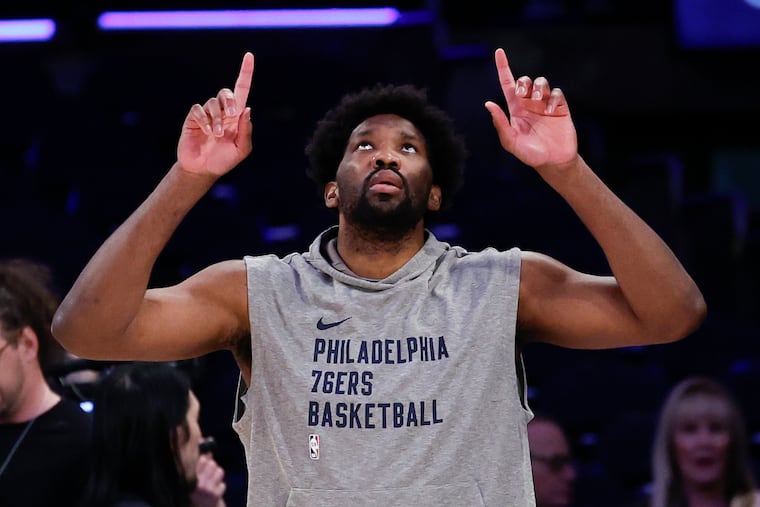Joel Embiid keeps choking in Sixers elimination games. Can he turn that around in Game 6 against the Knicks?
"The Process" is 4-6 in elimination games, and his stats are awful. He gets paid more than $50 million to show up in those moments. Shaq and Hakeem usually did.

If Andrew Toney is the “Boston Strangler,” does that make Joel Embiid the “Philly Choker?”
Toney earned his nickname thanks to his playoff exploits against the Celtics, the Sixers’ most hated rival.
Embiid has earned his nickname thanks to his playoff exploits against every opponent in every elimination game he’s ever played: Atlanta, Miami, Toronto, and (gag) Boston. Thrice.
Add New York.
If he plays like an MVP in Game 6 on Thursday, he might be able to shake that nickname before it catches on — because, like Sixers fans all series, he didn’t show up Tuesday.
The Sixers won Game 5 at Madison Square Garden in overtime, but got less from Embiid than they should have. The Process scored just 19 points. He pulled down 16 rebounds and dished 10 assists, but it was a Ben Simmons triple-double — the kind that insults the stat. Because he also missed 12 of 19 shots, was as passive as a mouse, and turned the ball over nine times, the most of his turnover-riddled playoff career.
» READ MORE: Tyrese Maxey has his Reggie Miller moment against the New York Knicks
Tyrese Maxey scored 46 points and carried the club from beginning to end, and beyond. It became his team on Tuesday night. Embiid had a decade to make it his, and he went oh-fer. History remembers winners, not whiners.
At the end of a long season, against a team that schemes to limit your output, in the biggest moments and on the brightest stages, he has, historically, often epically, failed. He makes more than $50 million a year, and will do so for the next two seasons. He makes that money to win playoff games, to carry the club against the best of the best in the biggest moments. Period.
He isn’t earning that money. He certainly didn’t earn it Tuesday night.
”There’s no way I can be as bad as I was,” he said afterward.
Of course there is.
He’s 4-6 in 10 elimination games, but Embiid is averaging 21.7 points, more than six points below his career regular-season average. He’s shooting 38.6% from the field, about 12 percentage points worse than his regular-season average. His 5.0 turnovers are 1.6 more than his regular-season average.
The issue with Embiid no longer concerns toughness or desire or heart. He has played through pain all postseason, and he has played mostly without relief in the second half the last two games.
The issue solely concerns effectiveness.
When the going gets tough, Embiid gets going ... home. Sure, he’s been injured a lot in postseasons, but he has never begun an NBA season in game shape, and injuries tend to find guys like that.
Anyway, it’s always something, right? A knee, a hand, an eye, an upset tummy. This year it’s a bad knee, Bell’s palsy, and, Tuesday morning, a raging migraine. He seems soooo very unlucky ... or so very unwilling.
It’s amazing that Hakeem Olajuwon and Shaquille O’Neal, the players with whom he most often is compared, never seemed to get sick, or hurt, or all headachy in the playoffs.
Or did they, and we just never heard about it?
» READ MORE: Tyrese Maxey, new Sixers alpha, wills them to a Game 5 win in New York despite Joel Embiid’s struggles
Olajuwon always rose to the occasion. He was 19-13 in elimination games, including 8-0 when the Rockets won the title in 1994 and 1995. He’s a legend for a reason.
Shaq, however, had issues. He was 6-12 in elimination games, but, more accurately, he was 5-10 before he became a part-time player at the end of his career.
He even began 1-6.
Except, unlike Embiid, even in defeat, Shaq showed up.
He averaged 26.8 points in his first 15 elimination games, about one point more than his regular-season average to that point. He shot 57.7%, about the same as his regular-season mark. He pulled down 10.7 rebounds, about one board less than his regular-season average, but he turned the ball over just 2.9 times both in elimination games and in the regular season.
If you contend that Embiid never had a Kobe Bryant or Dwyane Wade like Shaq did, that’s fair as long as we’re talking about the winning and losing. But the stats indicate that Embiid is one of the biggest reasons why they’re losing, not winning.
As for his limitations, well, he dropped 50 in Game 3. He tends to limp as the game progresses, but the limp disappears in the locker room after the game. In fact, he was in full trot when he ran away from the media after Game 1 — the game in which he left the court in the second quarter after landing hard on his left leg.
He dramatically iced his knee for about one minute Tuesday night, the minute he spent on the bench in the second half. It seemed performative.
» READ MORE: Joel Embiid labors through near-quadruple double, then relishes being The Garden’s villain after Sixers’ win
Again: Embiid is playing hurt, and he’s playing hard.
Again: So what?
He gets paid to play hurt, and hard.
He also gets paid to carry his team to wins when there is no tomorrow.
Thursday would be a fine time to start earning all those millions.